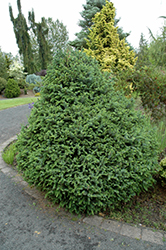It's all about ...
plants

Sugarloaf Sitka Spruce
Picea sitchensis 'Sugarloaf'
Height: 5 feet
Spread: 5 feet
Sunlight:
![]()
Hardiness Zone: 6b
Description:
A slow growing evergreen shrub with a dense pyramidal habit; lime green new foliage matures to silver blue needles with green undersides; a stunning choice to create interest in the smaller home landscape
Ornamental Features
Sugarloaf Sitka Spruce has attractive silvery blue foliage with green undersides which emerges lime green in spring on a dwarf conifer with a pyramidal habit of growth. The small needles are highly ornamental and remain silvery blue throughout the winter.
Landscape Attributes
Sugarloaf Sitka Spruce is a dense multi-stemmed evergreen shrub with a distinctive and refined pyramidal form. Its relatively fine texture sets it apart from other landscape plants with less refined foliage.
This is a relatively low maintenance shrub. When pruning is necessary, it is recommended to only trim back the new growth of the current season, other than to remove any dieback. Deer don't particularly care for this plant and will usually leave it alone in favor of tastier treats. It has no significant negative characteristics.
Sugarloaf Sitka Spruce is recommended for the following landscape applications;
- Accent
- Mass Planting
- Hedges/Screening
- General Garden Use
Planting & Growing
Sugarloaf Sitka Spruce will grow to be about 5 feet tall at maturity, with a spread of 5 feet. It tends to fill out right to the ground and therefore doesn't necessarily require facer plants in front, and is suitable for planting under power lines. It grows at a slow rate, and under ideal conditions can be expected to live for 80 years or more.
This shrub should only be grown in full sunlight. It does best in average to evenly moist conditions, but will not tolerate standing water. It is not particular as to soil type or pH. It is somewhat tolerant of urban pollution, and will benefit from being planted in a relatively sheltered location. Consider applying a thick mulch around the root zone in winter to protect it in exposed locations or colder microclimates. This is a selection of a native North American species.
This plant is not reliably hardy in our region, and certain restrictions may apply; contact the store for more information.
